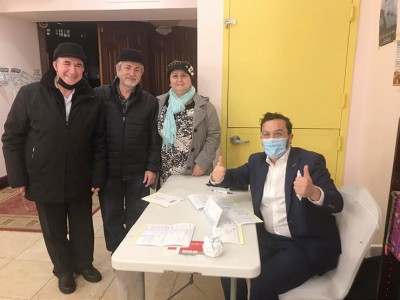
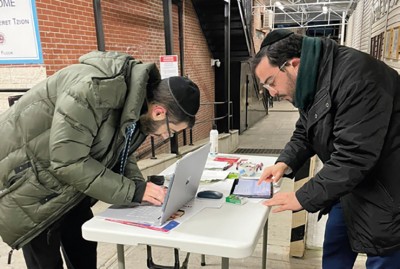
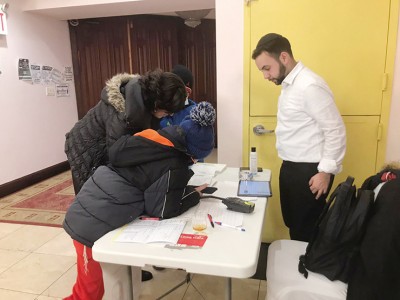
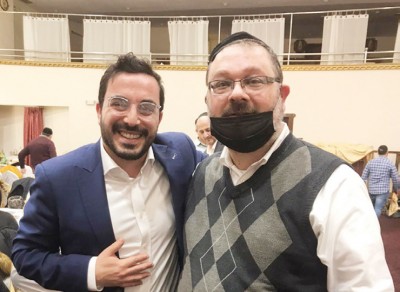
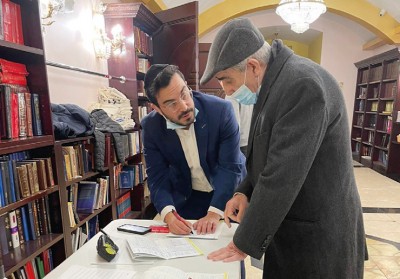
“Building a Stronger Future” is the slogan of Chazaq, the multifaceted communal nonprofit based in Queens. At first glance, this means promoting Jewish education through enrollment in yeshivos, summer camps, and after-school programs, but so much of the success behind these efforts is the result of political action.
Recognizing the importance of participation in public affairs, Chazaq is partnering with Chaverim of Queens, Queens Shmira, Emet Outreach, and the Alliance of Bukharian Americans, to register voters in the community, with five events between January 17 and 23.
“Local elections are more important than presidential elections in funding for our yeshivot and organizations, as well as our living standards concerning sanitation, snow removal, and street cleaning,” Chazaq CEO Rabbi Yaniv Meirov said. “We are reaching out to yeshivot to have their students registered.”
“When Chaverim of Queens was contacted to take part in the voting week initiative happening across District 29, I felt compelled to help out, because this is precisely what I stand for,” said Avi Cyperstein, a founder of Chaverim of Queens and a District 29 City Council candidate. “Our organization is built for filling the need for non-emergency issues as they arise.
In central Queens, this effort is largely focused on Bukharian Jews, a sizable community where the number of voters does not match with their potential as a voting bloc. David Mordukhaev of the Alliance of Bukharian Jews grew up in Queens and has heard typical excuses that discourage voting. “My father used to quote Stalin who said that the vote doesn’t matter; what really matters is who counts the vote. Older people in the community have a Soviet mindset that their vote doesn’t count,” he said.
In the past four years, the popularity of President Donald Trump among religious Jews has also impacted voting in the community. In New York, the Democratic Party has more registered voters than the Republican Party, and often it is the Democratic primary that determines the winner in local elections. Although there are Republican candidates in some races, their chances of winning in general elections have not been serious. As a result, Jewish community leaders across the city encourage the public to register as Democratic voters, and elect moderate and conservative candidates in the party’s primaries. “It is very difficult, because much of our community is conservative and supportive of Trump, but Trump is not on the ballot,” Mordukhaev said.
Making the case in traditional and social media, he experienced pushback with negative comments. With individual interactions, he’s had success. “When you meet on a personal level, it is time consuming and it works. You explain the strategy,” Mordukhaev said.
The Chazaq voter registration week had events at Ohr Natan in Rego Park, Beth Gavriel in Forest Hills, and Ner Mordechai in Kew Gardens from January 16 through January 23. These three synagogues are located in the 29th Council District, which has a ranked-choice Democratic primary in June to succeed Karen Koslowitz. Among the candidates are Cyperstein and former City Council staffer David Aronov. But there is also leftist Aleda Gagarin, whose husband ran in a primary last year against Rep. Grace Meng.
Rabbi Yeruchim Silber, the director of New York Government Relations for Agudath Israel of America, has also been coordinating voter outreach by assisting activists in Queens synagogues with their election pitches, and visiting high schools to register 12th graders to vote. “We’ve reached out to eight schools in Queens. The law allows for a 17-year-old to register if that voter is 18 on Election Day,” he said. “There will be three elections this year in central Queens. We come to the schools with tablets to register students on the spot.”
The first election will be in the 24th City Council District on February 2, a nonpartisan ranked choice election for the seat vacated by Rory Lancman. The candidates who reached out to the Orthodox Jewish community include former Councilman Jim Gennaro, Kew Gardens Hills residents Deepti Sharma and Neeta Jain, and Hillcrest resident Dilip Nath.
But there is a very real chance that Jamaica resident Moumita Ahmed could win this election as she received prominent endorsements from progressive elected officials and donations from across the country. A former organizer for Bernie Sanders, she affiliates with the Democratic Socialists of America, which supports boycotting Israel. On local issues, she supports raising property taxes, directly impacting the largely Jewish neighborhoods of Jamaica Estates, Hillcrest, Fresh Meadows, and Briarwood.
The winner of this special election will then run again in a Democratic Primary in June, and then the general election in November for a full term in this Council seat. In both districts, the most pressing issue is funding for local nonprofits that operate food pantries, afterschool programs, services for seniors, among other things. “Local elections have the most impact on the community,” Rabbi Silber said. “The City Council has money at its disposal to fund local organizations, and make decisions on zoning, traffic lights, street signs, and more. The Councilmember is your direct line to City Hall.”
By Sergey Kadinsky
Chazaq Leads Queens Voter Drive
Typography
- Smaller Small Medium Big Bigger
- Default Helvetica Segoe Georgia Times
- Reading Mode

